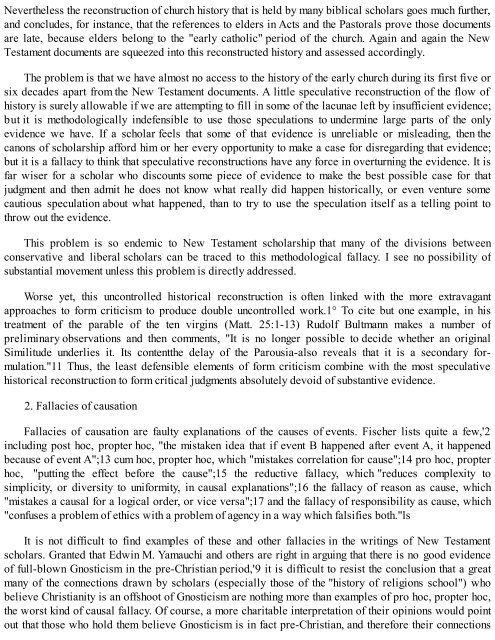Exegetical Fallacies - D. A. Carson
Exegetical Fallacies - D. A. Carson
Exegetical Fallacies - D. A. Carson
You also want an ePaper? Increase the reach of your titles
YUMPU automatically turns print PDFs into web optimized ePapers that Google loves.
Nevertheless the reconstruction of church history that is held by many biblical scholars goes much further,<br />
and concludes, for instance, that the references to elders in Acts and the Pastorals prove those documents<br />
are late, because elders belong to the "early catholic" period of the church. Again and again the New<br />
Testament documents are squeezed into this reconstructed history and assessed accordingly.<br />
The problem is that we have almost no access to the history of the early church during its first five or<br />
six decades apart from the New Testament documents. A little speculative reconstruction of the flow of<br />
history is surely allowable if we are attempting to fill in some of the lacunae left by insufficient evidence;<br />
but it is methodologically indefensible to use those speculations to undermine large parts of the only<br />
evidence we have. If a scholar feels that some of that evidence is unreliable or misleading, then the<br />
canons of scholarship afford him or her every opportunity to make a case for disregarding that evidence;<br />
but it is a fallacy to think that speculative reconstructions have any force in overturning the evidence. It is<br />
far wiser for a scholar who discounts some piece of evidence to make the best possible case for that<br />
judgment and then admit he does not know what really did happen historically, or even venture some<br />
cautious speculation about what happened, than to try to use the speculation itself as a telling point to<br />
throw out the evidence.<br />
This problem is so endemic to New Testament scholarship that many of the divisions between<br />
conservative and liberal scholars can be traced to this methodological fallacy. I see no possibility of<br />
substantial movement unless this problem is directly addressed.<br />
Worse yet, this uncontrolled historical reconstruction is often linked with the more extravagant<br />
approaches to form criticism to produce double uncontrolled work.1° To cite but one example, in his<br />
treatment of the parable of the ten virgins (Matt. 25:1-13) Rudolf Bultmann makes a number of<br />
preliminary observations and then comments, "It is no longer possible to decide whether an original<br />
Similitude underlies it. Its contentthe delay of the Parousia-also reveals that it is a secondary formulation."11<br />
Thus, the least defensible elements of form criticism combine with the most speculative<br />
historical reconstruction to form critical judgments absolutely devoid of substantive evidence.<br />
2. <strong>Fallacies</strong> of causation<br />
<strong>Fallacies</strong> of causation are faulty explanations of the causes of events. Fischer lists quite a few,'2<br />
including post hoc, propter hoc, "the mistaken idea that if event B happened after event A, it happened<br />
because of event A";13 cum hoc, propter hoc, which "mistakes correlation for cause";14 pro hoc, propter<br />
hoc, "putting the effect before the cause";15 the reductive fallacy, which "reduces complexity to<br />
simplicity, or diversity to uniformity, in causal explanations";16 the fallacy of reason as cause, which<br />
"mistakes a causal for a logical order, or vice versa";17 and the fallacy of responsibility as cause, which<br />
"confuses a problem of ethics with a problem of agency in a way which falsifies both."ls<br />
It is not difficult to find examples of these and other fallacies in the writings of New Testament<br />
scholars. Granted that Edwin M. Yamauchi and others are right in arguing that there is no good evidence<br />
of full-blown Gnosticism in the pre-Christian period,'9 it is difficult to resist the conclusion that a great<br />
many of the connections drawn by scholars (especially those of the "history of religions school") who<br />
believe Christianity is an offshoot of Gnosticism are nothing more than examples of pro hoc, propter hoc,<br />
the worst kind of causal fallacy. Of course, a more charitable interpretation of their opinions would point<br />
out that those who hold them believe Gnosticism is in fact pre-Christian, and therefore their connections



